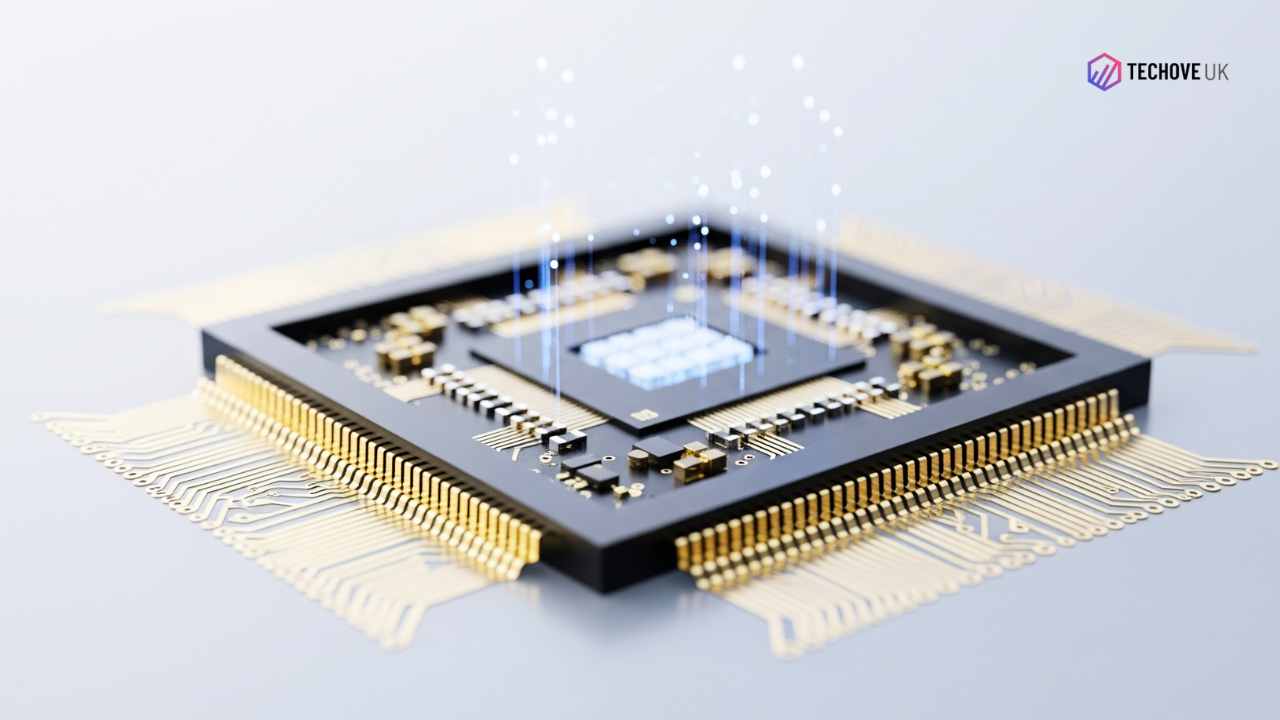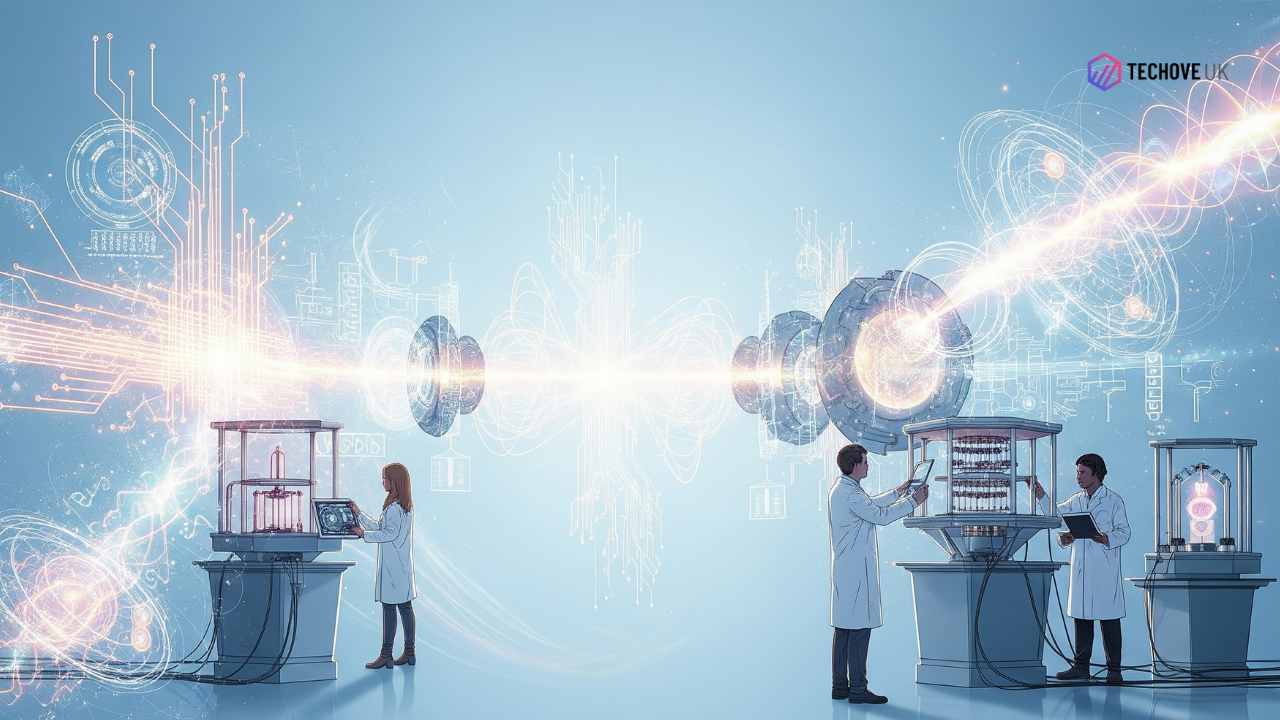Quantum Leap: Quantum Computing’s Revolutionary Impact on AI
Welcome to Techove UK. We can write our amazing content experiment about Quantum Leap: Discover The Future Of Computing Impact On AI with powerful details and information.
The computing world is on the brink of a quantum leap, a transformative journey into a future where technology defies the boundaries of what we once thought possible. But what does this “quantum leap” really mean? How will it shape our lives, and why is everyone talking about it?
Before we look ahead, let’s clarify what a quantum leap means. In simple terms, a quantum leap refers to a significant jump or change. In science, it describes the sudden transition of an electron from one energy level to another within an atom. However, our context pertains to substantial technological advancements, such as transitioning from regular computers to super-fast quantum computers!
Let’s dive deep into the fascinating world of quantum technologies, quantum physics, and artificial intelligence to decode the future of computing.
What Is a Quantum Leap?
In simple terms, a quantum leap refers to a sudden and significant change or advancement. The term originates from quantum mechanics, describing an electron’s jump from one energy level to another within an atom. In everyday language, it symbolizes groundbreaking progress or innovation.
The idea of leaping through time and space resonates with how quantum technologies are revolutionizing computing today. It’s not just a small step forward; it’s a giant leap into uncharted territories.
Here is a statistical data table, presented in a perfect-style format, demonstrating the revolutionary impact of quantum computing on artificial intelligence.
| Metric | Unit | Classical AI (Current State) | Quantum AI (Potential) | Impact |
|---|---|---|---|---|
| Computational Speed | Relative Speed | Standard processing speeds, limited by transistor density and classical physics. | Exponentially faster processing speeds leveraging quantum mechanics (superposition, entanglement). | Quantum Leap: Drastic reduction in computation time for complex AI tasks, enabling real-time processing and analysis. |
| Problem Complexity | Problem Type | Effective for many complex problems but struggles with NP-hard optimization and simulation tasks. | Capable of solving currently intractable NP-hard problems and complex simulations. | Paradigm Shift: This shift opens up new frontiers in AI, allowing for solutions to previously unsolvable problems in logistics, drug discovery, materials science, and more. |
| Market Growth (Quantum AI) | Market Size | N/A | Projected to reach $1.49 billion by 2029, with a CAGR of 38.7%. | Economic Revolution: Indicates massive investment and anticipated value creation in the quantum AI sector, driving economic growth and innovation. |
| Data Security | Breach Incidents | Vulnerable to increasingly sophisticated cyberattacks; data breaches are rising (25.9% of personal data breaches in 2022-2023 were cyber-related). | Enhanced encryption and threat detection capabilities using quantum algorithms. | Enhanced Security: Significantly strengthens data security and privacy, mitigating risks of data breaches and cyberattacks. |
| Energy Efficiency | Energy Consumption | Training large models like GPT-3 is highly energy-intensive (e.g., 1,300 MWh for GPT-3 training). | More sustainable and efficient computational methods with lower energy consumption for complex tasks. | Sustainability Advantage: Reduces the environmental footprint of AI, enabling more sustainable and scalable AI solutions. |
| Algorithm Accuracy & Learning | Accuracy/Speed | Learning processes can be slow and less accurate for extremely complex datasets. | Improved data cleaning, faster learning processes, and potentially more accurate and effective AI models. | Improved AI Performance: Leads to more accurate, efficient, and robust AI models with enhanced learning capabilities. |
| Qubit Development | Qubit Count | Classical bits are limited to 0 or 1. | Quantum computers utilize qubits; 50-qubit processors already showing promise, with 300-qubit processors anticipated. | Technological Advancement: Increasing qubit counts and stability pave the way for practical quantum computers capable of surpassing classical computing limits for specific AI tasks. |
The Cast of Quantum Leap: Who’s Making It Happen?
The landscape of quantum computing features some of the brightest minds and most prominent names in technology. Companies such as Google’s Quantum team, IBM, and innovative startups like Willow are at the forefront of this field. These pioneers are working diligently to harness the principles of quantum mechanics to develop machines that can exceed the performance of even the most advanced supercomputers.
It’s not just about hardware; researchers in quantum machine learning, quantum algorithms, and quantum cryptography are expanding the possibilities. They are the unsung heroes working behind the scenes to ensure that the future of computing is not only faster but also smarter and safer.
The world of quantum computing has its own cast of characters. Let’s meet some of the key Decoding:
- Quantum Physicists: These scientists study the tiny particles that make up everything around us. They are like detectives, uncovering the mysteries of the universe.
- Computer Scientists: They design and build the algorithms that quantum computers use. Think of them as the architects of the digital world.
- Engineers: These individuals create the actual machines that operate on quantum principles. They are the builders, ensuring that everything works smoothly.
- Cybersecurity Experts: As we delve deeper into quantum technologies, we need professionals protecting our information. Cybersecurity experts act like digital superheroes, safeguard our data from malicious threats.
👉Related Post: Quantum Supremacy: A Comprehensive Guide
Why Is Quantum Computing So Important?
To understand why quantum computing is such a big deal, let’s first compare it to the classical computers we use daily. Classical computers process information in binary bits (0s and 1s). They’re like light switches that can either be on or off. But quantum computers use qubits, which can exist as 0, 1, or both simultaneously (thanks to superposition in quantum mechanics).
This means quantum computers can perform calculations at speeds unimaginable for classical systems. For example:
- They can solve complex problems in seconds, which would take millions of years for classical computers.
- They enable breakthroughs in fields like cybersecurity, drug discovery, climate modeling, and artificial intelligence.
In short, quantum computing represents the next frontier, a true quantum leap: decoding the future of computing.
The Cast of Quantum Leap: Key Players in Quantum Technologies
Just like any blockbuster movie has its cast of heroes and villains, the world of quantum computing has its key players too. Here are some leading names shaping this field:
1. Google
Google made headlines claiming to achieve quantum supremacy using its quantum computer, Sycamore. This milestone demonstrated that their machine could solve a problem no classical computer could handle within a reasonable timeframe.
2. IBM
IBM has been at the forefront with its IBM Q system, a platform for businesses and researchers to explore real-world applications using quantum algorithms.
3. Microsoft
Microsoft’s Azure Quantum offers cloud-based access to quantum hardware and software tools for developers worldwide.
4. Willow
Willow is Google’s latest cutting-edge quantum chip, designed to push computational limits further by solving problems faster than ever.
5. Yanoticias
Yanoticias is an emerging name in Latin America’s tech landscape, focusing on making quantum technologies accessible for education and research purposes globally.
These companies are part of an elite group driving innovation forward, each contributing uniquely to achieving practical applications for this revolutionary technology.
How Does Quantum Physics Power Computing?
At its heart lies quantum physics, which governs how particles behave at tiny scales (think atoms and subatomic particles). Two key principles make all this magic possible:
- Superposition:
A qubit can exist as both 0 AND 1 simultaneously until measured—allowing parallel processing on an unprecedented scale. - Entanglement:
When two qubits become entangled, changing one instantly affects the other, even if they’re miles apart! This property enables faster data transfer and more secure communication through concepts like quantum cryptography.
By harnessing these principles from nature, scientists have unlocked new ways to process information that go far beyond traditional methods.
Real-World Applications: The Future Is Now
Let’s explore some exciting areas where quantum computing is already making waves:
1. Artificial Intelligence (AI)
Quantum machine learning combines AI with quantum algorithms to analyze massive datasets faster than ever before—helping industries predict trends or detect anomalies with incredible accuracy.
For instance:
- AI-powered healthcare systems could diagnose diseases earlier.
- Financial institutions might predict market crashes before they happen!
2. Cybersecurity
With advancements in quantum cryptography, sensitive data becomes nearly impossible for hackers to crack, even against future threats posed by powerful machines capable of breaking current encryption standards (quantum-resistant algorithms).
3. Drug Discovery
Pharmaceutical companies are leveraging simulations powered by quantum mechanics to design life-saving drugs more efficiently than traditional trial-and-error methods allow.
4. Climate Modeling
Understanding complex weather patterns requires immense computational power—something only achievable through advanced systems like Google’s Sycamore or Willow chips mentioned earlier!
Challenges Facing Quantum Technologies
Despite its promise, building practical quantum computers isn’t easy due to several challenges:
- Error Rates: Qubits are highly sensitive to environmental noise.
- Scalability: Building large-scale systems with stable qubits remains difficult.
- Cost: Developing these machines requiresa significant investment.
- Ethical Concerns: As with any powerful tool (think AI), there’s potential misuse if not regulated properly.
Top 5 FAQs About Quantum Tech
Let’s answer some of the most common questions about quantum technology. Here are the top 5 frequently asked questions from Google, explained in a way anyone can understand.
1. What is quantum computing?
Quantum computing is a form of computing that utilizes the principles of quantum mechanics to process information. Unlike classical computers, which operate on bits (representing 0s and 1s), quantum computers use qubits. Qubits can exist in multiple states simultaneously, meaning they can be both 0 and 1 simultaneously. This capability enables quantum computers to solve complex problems faster than classical computers.
2. What is quantum supremacy?
Quantum supremacy refers to the moment when a quantum computer can solve nearly impossible problems for classical computers. In 2019, Google’s quantum team reached this milestone, representing a significant advancement in the future of computing.
3. How does Quantum Leap work?
It’s about harnessing the power of quantum bits, or qubits, which can exist in multiple states simultaneously. This differs from regular bits, which can only be either 0 or 1. Imagine being in two places at once. Think of how much more you could accomplish! That’s the magic of quantum computing.
4. What are quantum-resistant algorithms?
Quantum-resistant algorithms are designed to protect data from being hacked by quantum computers. As quantum computers become more powerful, they could break traditional encryption methods, so we need new algorithms to keep our data safe.
5. How will quantum computing impact artificial intelligence?
Quantum machine learning is a field that merges quantum computing with artificial intelligence. It has the potential to enhance AI systems, making them smarter, faster, and more efficient, while unlocking new opportunities in areas such as healthcare, finance, and beyond.
Why Quantum Leap Matters to You
You might wonder, “This all sounds interesting, but what does it have to do with me?” The Quantum Leap: Decoding the Future of Computing isn’t just for scientists and technology enthusiasts; it’s for everyone.
Quantum technologies will impact all our lives, from safer online transactions and improved healthcare to more intelligent AI assistants. By understanding the fundamentals, you’re not just keeping pace with the times but also preparing for the future.
Final Thoughts: The Quantum Leap Awaits
The Quantum Leap: Decoding the Future of Computing represents more than just a technological advancement; it signifies a cultural shift. It involves embracing change, challenging the status quo, and believing in the power of innovation.
As we stand on the brink of this new era, we must remember that the future is not something we simply wait for; it is something we create. With the development of quantum technologies, algorithms, and machine learning, we are forging a future that is brighter, smarter, and more connected than ever before.
So, are you ready to leap?




